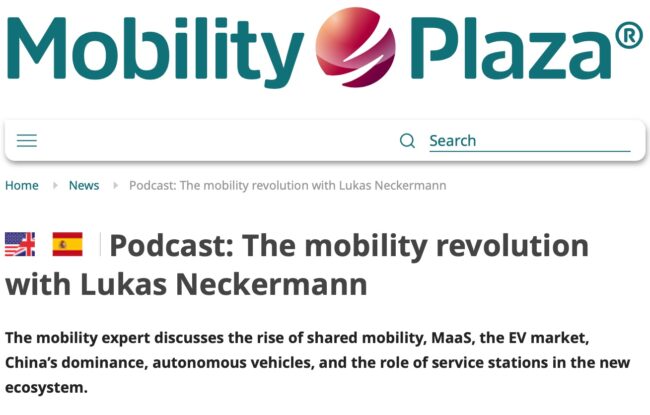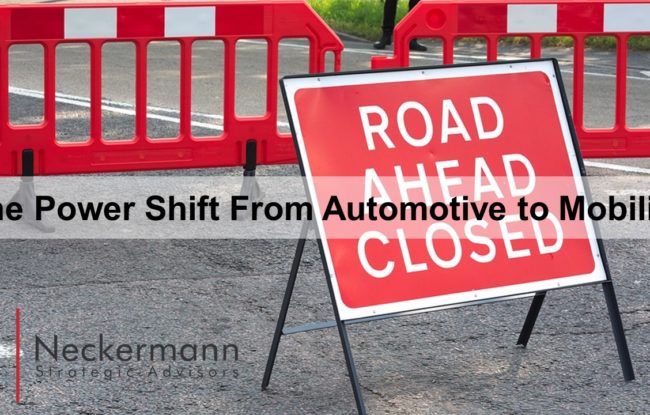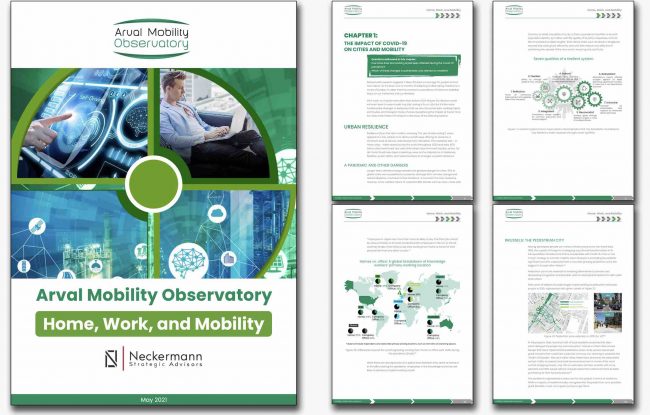(Lukas Neckermann, Managing Director of Neckermann Strategic Advisors, interviewed by David Hunt, Managing Partner of Hyperion Executive Search. This article was first published January 26th 2018, here.)
Hunt: I’m delighted to welcome Lukas Neckermann as an advisor to the Hyperion team. Lukas is an author, key-note speaker, and consultant to the great and good in the sector. We know the eMobility market is an exciting and dynamic place, ever changing, I’ve asked Lukas to share some thoughts about where we are, and what the future may hold. Let’s start. We see that innovation in both technology and business models are changing at speed, what are the some of the things you are most looking forward to see evolve or come to market in 2018?
Neckermann: 2018 will be the year that Smart Mobility grows up. With respect to electrification, we’ll see a new wave of PHEV and BEV vehicles come to market that will be realistic and attractive options for the mass-market, not just for innovators and early-adopters. It is also the year that more appealing shared-use and part-ownership concepts will start to be offered by big-name players. Last but not least, we will hear lots about mobility-as-a-service (MaaS). There’ll be countless cities, of all sizes, looking to MaaS solutions to integrate their individual transport elements.
Hunt: Your most recent book, ‘Smart Cities, Smart Mobility: Transforming the way we live and work’, is a staple read in the Hyperion office. What struck me was how much, particularly around smart cities, is already being done, and that mayors and cities are leading the way, not nation states. Why do you think this is?
Neckermann: When we talk about Smart Mobility, most people immediately think of cars, but what can cities do? Mayors have direct responsibility for the health of their cities and the quality of life of their residents – much more so than national governments. In many cities, traffic congestion and air quality are among the very top concerns, in some cases even impacting the productivity of businesses. It’s the reason we see congestion charging, road diets, bicycle lanes and carsharing schemes emerging in cities all over the world. Let’s not forget that cities also make massive investments as well – of which we are reminded every time there is another announcement about the electrification of city buses and commercial fleets. Taking a “Smart” approach to managing mobility, energy, infrastructure and the workings of the city simply makes sense, and organisations like the C40 Cities Climate Group under Paris Mayor Anne Hidalgo and Michael Bloomberg are helping coordinate their efforts.
Hunt: You’ve had a long career working for, and with, auto manufacturers; I get the impression some of them really ‘get’ the electrification transition, and are committed to it, whilst some are playing lip service. Who do you think are the companies that will remain, or become, the car companies of the future?
Neckermann: Assuming sufficient Model 3 production and no substantial quality issues, Tesla will have a breakthrough year. Among traditional OEMs, Renault-Nissan and BMW were early leaders in electrification, but they are still waiting for profitability from their early investments, and as a result we are waiting for more products as well. Daimler has been consistently forward looking with respect to mobility, and has a solid plan for electrification going forward. Volkswagen has made some ambitious announcements on electrification, and its MOIA brand goes in the right direction for European cities. GM CEO Mary Barra is recalibrating the company toward shared, autonomous and electric mobility, and has an interesting portfolio of investments, from Cruise to Maven, and a collaboration with Lyft. It will also be worth watching Ford – who is has, quite interestingly, just launched Smart City projects and Volvo, who has launched new concepts in ownership, now copied by many. Looking ahead, I still think there will be a wave of failures and consolidations among traditional OEMs, who are under a lot of pressure from creative startups in the tech field. In turn, there’ll be a good number of market entrants, especially from China. Watch out for Byton, Beijing Electric, Nio and BYD.
Hunt: In previous books and publications, you’ve talked about the ‘Three zeroes’; Zero emissions, Zero accidents, and zero ownership, and it’s a concept you’ve been talking about for some time. Have your thoughts on this changed since you first came up with the concept?
Neckermann: Since writing the book in 2014, I have seen companies brand their mobility efforts “CASE” (for connected, autonomous, shared, and electric), as well as “ACES”, and even “FACES”. I have seen ZF declare their aim to be “Zero Accidents and Zero Emissions”, and GM call its efforts “Triple Zero” (for Zero Crashes, Zero Emissions, and Zero Congestion). At CES one company simply copied my book title and declared it was building solutions for The Mobility Revolution, Zero Emissions, Zero Accidents, and Zero Ownership. I feel flattered, amused, and most importantly, confirmed in that this is the direction forward. The Three Zeroes are simply an easy and compelling way to summarise the direction we are headed in. Will we reach “Zero”? Who knows – but the aim is clear.
Hunt: In the cleantech sector talk is focused heavily on technology, and finance, but as you know we bang the drum about people, about talent. In our mind progress only happens when you have the right people, in the right place, at the right time. Do you think enough attention is given to people, both as users, and developers of clean technologies?
Neckermann: Good tech and all the finance in the world will not save a poor-functioning team from failure. In turn, talented, passionate people in the right roles can create compelling solutions, even with average tech. Good leaders know that finding the right people is the great differentiator, just as investors know that a startup’s team is more important than their tech. The challenge we face as a society right now, is helping millions of talented, passionate people transition to a new world, through education, exposure and challenging assignments.




